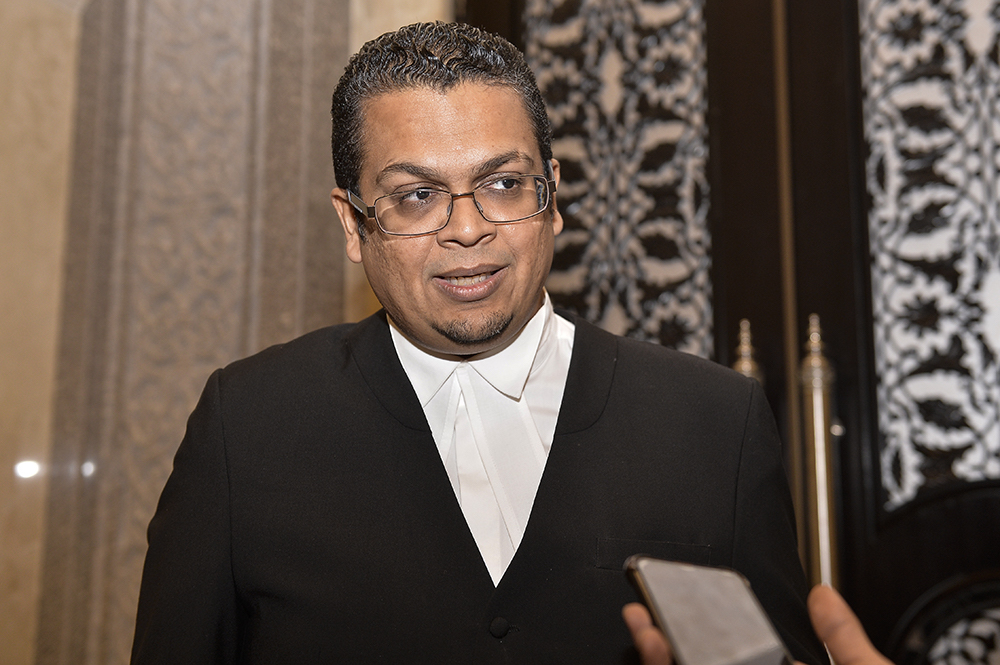KUALA LUMPUR, Aug 21 ― Unlike past coalitions that led the country, the two most recent ones ― Pakatan Harapan and Perikatan Nasional (PN) ― collapsed within a span of two years due to shifts in political loyalties and a numbers game after MPs withdrew their support.
On August 16, the PN government fell when Tan Sri Muhyiddin Yassin stepped down as prime minister. He believed he had lost the majority support from the MPs (without even going to the Dewan Rakyat to prove it through a vote of confidence in September as initially planned), and his Cabinet similarly tendered their resignation to the Yang di-Pertuan Agong.
Yesterday, the Agong announced Umno’s Datuk Seri Ismail Sabri Yaakob as the next prime minister, after being satisfied the latter enjoyed the support of the majority of lawmakers.
Malay Mail spoke to several lawyers, an electoral reform group and an MP for their thoughts on a simple and conclusive solution that could be adopted in future to avoid a recurrent or prolonged political uncertainty with repeated challenges to a new prime minister.

MPs to promise support publicly
Thomas Fann, who chairs the electoral reform group Bersih 2.0, said the new prime minister should have the MPs vote in the Dewan Rakyat on whether they back his leadership or not.
“The new prime minister must quickly convene a special meeting and table a motion of confidence in himself to prove his majority. This not only fulfils the demand of Article 43(2)(a) of the Federal Constitution ‘to command the confidence of the majority of the [House of Representatives]’, but would also force the MPs to state publicly where they stand with regard to the new PM and government.
“If the majority is proven, though not required by law, we hope that with this public show of support for the new PM, the MPs would also make a pledge that they would remain steadfast till the end of this parliamentary term in two years’ time or whenever GE15 is called.
“The country cannot afford to go through endless political machinations in the midst of the health and economic crisis we are in,” he said.
Malaysia’s 15th general election is due in 2023 as the last one was held in May 2018.
General elections can also be called earlier, but political party leaders whom Malay Mail contacted were not in favour of snap polls now.
Parti Amanah Negara deputy president Datuk Seri Salahuddin Ayub and Amanah communications director Khalid Samad, Upko president Datuk Seri Wilfred Madius Tangau, PKR strategy director Sim Tze Tzin and Umno vice-president Datuk Seri Mohamed Khaled Nordin all said that a general election should not be held now under the current severe Covid-19 situation.

What the law says
Lawyer Nizam Bashir said the Yang di-Pertuan Agong would under the Federal Constitution’s Article 43 ordinarily appoint a prime minister who “in his judgment is likely to command the confidence of the majority of the members” of the Dewan Rakyat.
When the incumbent prime minister is alleged to have lost majority support or the confidence of the Dewan Rakyat, Nizam said “the assessment of majority support is ― as a matter of law ― to be tested on the floor of the house” or in other words, through voting done at the Dewan Rakyat which is the lower house of Parliament in Malaysia.
“To paraphrase what was held by the Indian Supreme Court in a particular judgment, a 'floor test' would be obligatory given: a. the democratic principle underlying the Constitution; and b. the fact that the Dewan Rakyat represents the will of the people and not anyone else,” he explained to Malay Mail on Monday.
In a situation where the current prime minister resigns and is replaced by a new prime minister, Nizam said the same move of holding a “floor test” should also be carried out by a new prime minister.
“If we are talking about upholding rule of law and upholding the ideals of democratic principles as embodied in the Federal Constitution, then a new PM should similarly hold a vote of confidence as the first order of business in Parliament,” he said.
Nizam made clear that the Federal Constitution does not expressly prescribe the holding of a “floor test” but said this would be obligatory in terms of upholding the rule of law, contrasting this with other methods of measuring majority support.
“Part of the problem with statutory declarations or any other mode of assessing support is that: a. we do not know the pressures or incentives that may be placed on an individual to express that support and the last time when statutory declarations were put forward, the Yang di Pertuan Agong still opted to interview parties; and b. the assessment may be said to be subjective or questioned,” he said.
Nizam also said having a vote of confidence would help cut down on political uncertainties.
“Carrying out a 'floor test' when an incumbent prime minister or chief minister is alleged to have lost majority support or the confidence of the House or by a newly appointed prime minister or chief minister is only good practice and shores up the rule of law in this country.
“Any uncertainties of the legitimacy of the leader is similarly resolved and reduces any political uncertainty where that leader is concerned,” he said.
“Whatever the case, what is most important for the country at this juncture is less politicking or jostling for positions. The interests of the people and the country must come to the fore,” he added.
.jpg)
Lawyer New Sin Yew on Monday told Malay Mail that it is not required by law for any new prime minister to prove his majority, but noted the constitutional provision of Article 43(2) that requires a prime minister to have majority support.
“Art 43(2) says “the Yang di-Pertuan Agong shall first appoint as prime minister to preside over the Cabinet a member of the House of Representatives who in his judgment is likely to command the confidence of the majority of the members of that House”.
“This means a MP must have the votes of at least 112 MPs,” he said, referring to the bare minimum needed for a simple majority out of the 222 MPs in the Dewan Rakyat. Currently, there are only 220 MPs as two seats are vacant after two MPs’ death, which means the simple majority now required is 111.
“The votes are usually tested through a vote of confidence / no-confidence in Parliament / or passing the budget. This is the convention under a Westminster system,” he said, referring to the parliamentary system that is used in the UK and which Malaysia’s own parliamentary system is modelled after.
“Since the Perak crisis, confidence could also be tested outside of Parliament through statutory declarations and most recently, interviews with the YDPA,” he said, adding however these two new methods are not part of existing conventions.
As for a situation where there is no clear majority, New said: “Art 43(2) says the PM is someone who in the YDPA’s judgment is likely to command majority support. This leaves room for someone whose majority support is unclear to be appointed PM and let it be tested in the House. So new PM may be appointed with less than 111 MP’s support.”
New said ideally the new prime minister’s majority support should be tested through a vote in Parliament when it is unclear if he has the majority, with a vote on the King’s speech available as an alternative means of testing support for a government.
“If such new PM is appointed when there is no clear majority, he will have to test his confidence once Parliament sits. As a matter of good democratic practice, there should be a confidence/no-confidence motion to be debated.
“Alternatively, the King’s speech would be a test. If the new PM fails, then he must tender his resignation or request for Parliament to be dissolved. The process then starts again,” he said, referring to the Yang di-Pertuan Agong’s opening speech at the start of parliamentary meetings and the subsequent motion on the King’s speech that have to be voted on by MPs.
When announcing Ismail Sabri as the new PM, Istana Negara also said there were statutory declarations from 114 MPs endorsing him. However, the Agong previously said the next prime minister should call for a confidence vote once Parliament was reconvened.

A convention that other PMs in Malaysia also followed
Previously when contacted by Malay Mail, PKR strategy director Sim Tze Tzin also shared that putting up a motion for vote of confidence is an existing convention in Parliament for new prime ministers that come in mid-term.
Sim said this was not in the Federal Constitution, but was a convention that was carried out by previous prime ministers Tun Hussein Onn and Tun Abdullah Ahmad Badawi.
“Muhyiddin didn’t do that, whereas Tun Hussein Onn did that, Badawi did that, it’s a convention that the PM must go back to the lower house to establish majority,” Sim who is also Bayan Baru MP told Malay Mail recently.
When asked whether Datuk Seri Najib Razak and Tun Dr Mahathir Mohamad had also gone to the Dewan Rakyat to table a motion of confidence, Sim pointed out that they did not have to do so as they had already proven their majority support through voters casting votes at the ballot box.
“That’s different, the coalitions they led won the elections, so there’s no issue about majority. In the mid-term, when they change prime ministers, they go back to the lower house to establish a majority,” he explained.
The UK Parliament’s House of Commons Library’s website shows that there are three main types of parliamentary motions that can be voted on by MPs and which can be used to test confidence in the government, namely confidence motions initiated by the government, no confidence motions initiated by the opposition, and other motions that can be considered as motions of confidence or censure in a government. The House of Commons is the lower house of Parliament in the UK. - malaymail




No comments:
Post a Comment
Note: Only a member of this blog may post a comment.